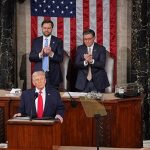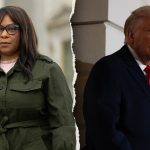President Donald Trump and his MAGA agenda are not shy when it comes to bending conservative norms. In his second term, states’ rights, once a rallying cry for conservatives, are under pressure. Trump has strong-armed private companies and universities, and is testing the approach to free speech, while showing flexible foreign policy when it comes to adversaries like China. This Washington Examiner series, Upend the Orthodoxy, will take an in-depth look at all of these.
President Donald Trump’s approach to free speech has attracted criticism from Democrats and Republicans.
While Democrats have expressed concerns about Trump’s posture toward student protests and dissent within his administration, it is his executive order last month regarding flag burning that has conservatives concerned that he has gone too far.
Regardless, free speech experts, including Robert Shibley of the Foundation for Individual Rights and Expression’s Kevin Goldberg of Freedom Forum, underscore how Trump’s approach to the First Amendment should be a concern, irrespective of a person’s politics, because of the precedent it sets for the future.
“Free speech activists and lawyers are always warning that this is a rule that’s going to be for everybody and you need to be aware that your opponents can use the same weapons against you,” Shibley told the Washington Examiner. “One example we do often use, and I would ask conservatives to think about this: Are you comfortable with President [Alexandria] Ocasio-Cortez using this same power to go after her political opponents in 2029?
For Freedom Forum’s Goldberg, the “beauty of the First Amendment” is that it is viewpoint neutral and the protections “are supposed to stay the same regardless of who is in power, recognizing that we will have regular changes.”
“If you’re not a Trump supporter, obviously it’s going to concern you because it will directly impact your ability or your comfort in speaking out,” Goldberg told the Washington Examiner. “If you are a Trump supporter, it will affect your ability or your comfort in speaking out at some point.”
Republican criticism
Libertarian Rep. Thomas Massie (R-KY) was one Republican who criticized Trump’s flag burning executive order, describing it as “nenarded” and contending “it’s not illegal, nor should it be.”
“No one should want a federal government so powerful that it can lock you up for a year for burning your own stuff,” Massie wrote on social media. “Thankfully, our Constitution prohibits Congress from making such stupid laws.”
When asked about concerns regarding the precedent Trump has set related to free speech, the White House remained adamant that the president “will always protect the First Amendment rights of all Americans.”
“On his first day in office, he signed a powerful executive order on free speech to undo the massive censorship carried out by the Biden administration and to ensure the American people can engage in constitutionally protected speech,” White House spokeswoman Liz Huston told the Washington Examiner.
Former White House press secretary Ari Fleischer agreed, arguing that Trump’s approach to free speech does not “even come close to crossing the line.”
“I never agreed with the Supreme Court about flag burning equals speech, so I hope the president’s position prevails,” Fleischer told the Washington Examiner. “Student protests, of course, are fine. Harassment, intimidation, and violence are not. I have confidence speech will be protected and I welcome an effort to protect against harassment, intimidation, and violence.”
Fleischer, a spokesman for former President George W. Bush, added: “The job of people in the executive branch is to support the executive under whom they serve. If they oppose him, the right course is to resign. If they openly oppose their boss, they’re the ones putting their jobs at risk, just as it is for any employee who picks a fight with their employer. Trump is tough, but I think his actions are the right ones.”
Flag burning
Trump’s executive order on flag burning directed Attorney General Pam Bondi “to vigorously prosecute those who violate our laws in ways that involve desecrating the flag, and to pursue litigation to clarify the scope of the First Amendment in this area.”
“It also instructs the Attorney General to refer flag desecration cases that violate state or local laws to appropriate state or local authorities,” the White House wrote in a fact sheet. “Finally, the order directs the Secretaries of State and Homeland Security and the Attorney General to deny, prohibit, terminate, or revoke visas, residence permits, or naturalization proceedings, and other immigration benefits, or seek removal from the United States, wherever there has been an appropriate determination that flag desecration by foreign nationals permits the exercise of those remedies under applicable law.”
The White House has asserted that “the Supreme Court has never held that flag desecration conducted in a manner that is likely to incite imminent lawless action or serve as a form of ‘fighting words’ is constitutionally protected,” an acknowledgement that the Supreme Court found in Texas v. Johnson and the United States v. Eichman that flag burning is, generally, protected by the First Amendment as free, expressive speech.
Trump also told reporters during the executive order’s signing ceremony that, “If you burn a flag, you get one year in jail,” despite presidents not having the power to introduce a crime that is punishable by prison time.
“They called it freedom of speech,” he said in the Oval Office. “But when you burn the American flag, it incites riots at levels that we’ve never seen before. People go crazy in a way.”
Freedom Forum’s Goldberg disagreed with the White House’s argument that flag burning is a “de facto incitement of imminent lawless action” under the First Amendment.
“Signalling an intent to go after these people with extra vigor when they might not have been prosecuted in the past, it draws in an element of content-based viewpoint discrimination that creates First Amendment issues,” he said.
Student protests
Trump’s flag burning executive order coincides with his posture toward student protests, particularly pro-Gaza or Palestinian demonstrations, and dissent within his administration, best evidenced by Federal Emergency Management Agency employees being placed on administrative leave last month after signing an open letter criticizing his disaster preparedness. Other instances of his stance regarding free speech include his rescission of conditional funding for organizations, such as Voice of America, NPR, and PBS, his review of Smithsonian museums, and his retribution against law firms and news outlets.
Regarding student protests, Freedom Forum’s Goldberg reiterated that violent demonstrations and destruction of property are not forms of free speech because they are not expressions, but illegal acts.
“Shutting down a protest because of a single violent act would be contrary to established law,” he said. “Over time, going after only protests that are pro-Gaza would raise significant First Amendment concerns because while the First Amendment allows for the establishment of limited time, place, and manner restrictions on speech… those have to be viewpoint neutral.”
Shibley, Foundation for Individual Rights and Expression’s special counsel for campus advocacy, referenced a lawsuit his organization has filed against Trump over his posture against student protests, specifically his deportation of foreign nationals who have expressed pro-Gaza or Palestinian viewpoints. In the past, FIRE has advocated that more conservative voices be invited on college campuses nationwide.
“It’s not just about the message that we send to people who might be here on visas from authoritarian countries, but also they’re entitled to make up their own minds about the things they’re hearing here in the United States,” Shibley said. “There’s also the spillover effect on students and faculty members on those campuses who are American, who are going to be more reluctant to bring up issues where a discussion might get their roommate or their friend deported if they speak up and take the wrong side of an argument.”
Administration dissent
Of administration dissent, Freedom Forum’s Goldberg conceded that there are fewer free speech protections for federal government employees.
“The rule there is basically if I work for government and I’m speaking on something outside of my job duties, the official course of my job, I am allowed to speak as long as a.) I’m speaking on a matter of public concern, and b.) it’s not causing disruption in the workplace,” he said. “The government bears the burden of justifying why the restriction is needed.”
Regardless, Rebecca Petras, cofounder of nonpartisan whistleblower support nonprofit organization Psst.org, criticized Trump’s approach to free speech, repeating “until recently, the U.S. had one of the strongest accountability systems among liberal democracies.”
“Suspending or firing workers who raise concerns — instead of addressing those concerns — delivers a direct blow to that system,” Petras told the Washington Examiner. “The chilling effect is immediate and severe, and that lost trust will be extremely difficult to rebuild. This is particularly alarming in the case of FEMA, given the stakes for public safety.”
What about Trump’s predecessors?
Nevertheless, Freedom Forum’s Goldberg was careful not to scrutinize Trump’s approach to free speech as “worse than any other administration,” saying the president has been “simply more active” regarding the First Amendment than his predecessors.
“Every administration has its share of acts that are threatening to the First Amendment,” he said. “The Biden administration, even if they didn’t lose in court, clearly leaned on social media platforms to moderate content in a way that the administration wanted them to do. The Obama administration famously went after leakers, even sweeping reporters into that net. Those were probably, tended to be more one-off. They were equally egregious, though.”
TRUMP SEES CRIME CRACKDOWN AS THE ISSUE TO BLOW UP BLUE-CITY DEMOCRATIC COALITION
The Trump administration has been criticized for being hypocritical in its scrutiny of free speech abroad in the United Kingdom and Europe based on its approach to the First Amendment at home. Vice President JD Vance first expressed his concerns during his address in February at the Munich Security Conference and then during a White House meeting that same month with British Prime Minister Keir Starmer.
Vance later told Gateway Pundit that “Europe, in some ways, has followed the pathway of the United States under the Biden administration, to censorship, to trying to silence people, instead of persuading people, and that’s what I wanted to call out the Munich Security Conference.”








 , is covered by the First Amendment to the United States Constitution. Neither Congress nor the President nor a Judge can make it illegal.
, is covered by the First Amendment to the United States Constitution. Neither Congress nor the President nor a Judge can make it illegal. 















